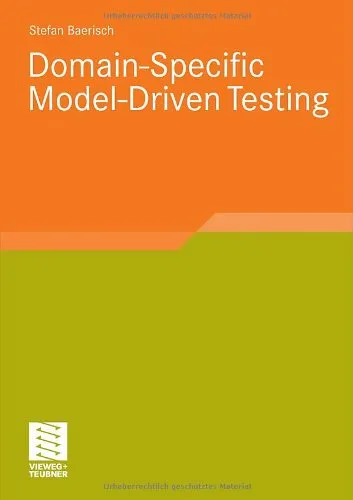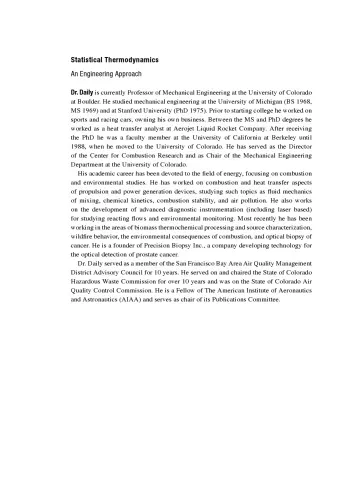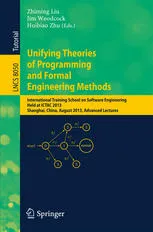Trustworthy Systems Through Quantitative Software Engineering
4.5
بر اساس نظر کاربران

شما میتونید سوالاتتون در باره کتاب رو از هوش مصنوعیش بعد از ورود بپرسید
هر دانلود یا پرسش از هوش مصنوعی 2 امتیاز لازم دارد، برای بدست آوردن امتیاز رایگان، به صفحه ی راهنمای امتیازات سر بزنید و یک سری کار ارزشمند انجام بدینRelated Refrences:
معرفی جامع کتاب "Trustworthy Systems Through Quantitative Software Engineering"
کتاب "Trustworthy Systems Through Quantitative Software Engineering" نوشته لاورنس برنشتاین و سی. ام. یوهس، راهنمایی جامع و علمی در راستای توسعهٔ سیستمهای باکیفیت و پایدار در مهندسی نرمافزار است. این اثر برجسته، با استفاده از روشها و متدهای علمی و کمی، اهمیت قابلیت اطمینان، ایمنی و کارآیی سیستمها در پروژههای نرمافزاری را با دقت و عمق بررسی میکند. نویسندگان این کتاب با دههها تجربه عملی و آکادمیک، دیدگاهی روشن و کاربردی نسبت به پیادهسازی سیستمهای نرمافزاری ساختهاند که قابل اعتماد، مقیاسپذیر و ایمن باشند.
خلاصهای از کتاب
این کتاب در ابتدا به چالشهای اصلی توسعه سیستمهای پیچیده نرمافزاری پرداخته و سپس مجموعهای از تکنیکها و معیارهای کمی و اثباتشده برای طراحی، توسعه و ارزیابی این سیستمها ارائه میدهد. نویسندگان به عمق مفاهیمی همچون Reliability، Safety، Security و Performance رفته و اهمیت آنها را در موفقیت پروژههای نرمافزاری توضیح میدهند. از متدهای کلاسیکی همچون Capability Maturity Model Integration (CMMI) گرفته تا ابزارهای نوین در تصمیمگیری تحلیلی و مدیریت پروژه، همه در این کتاب به وضوح مورد بحث قرار میگیرند.
در این کتاب، اصول Quantitative Software Engineering به طور سیستماتیک به توسعهدهندگان و مدیران پروژه معرفی میشود. در نتیجه، خوانندگان میتوانند تواناییهای خود را برای کنترل کیفیت، کاهش خطا و افزایش کارایی سیستمها ارتقا دهند.
نکات کلیدی کتاب
- استفاده از دادهها برای تحلیل و پیشبینی موفقیت پروژههای نرمافزاری.
- ارتباط میان مدیریت پروژه و متدهای دقیق Quantitative Software Engineering.
- بررسی چرخهٔ عمر نرمافزار و تأثیر معیارهای قابل اندازهگیری برای پیشبینی کیفیت.
- اهمیت اسناد، Documentation، در افزایش قابل اطمینان بودن سیستمها.
- تکنیکهای پیشرفته برای مدیریت ریسک و تصمیمگیری مبتنی بر اطلاعات.
جملات معروف از کتاب
"A system is only as trustworthy as the discipline and engineering rigor used to build it."
"Quantitative Software Engineering transforms subjective decisions into data-driven insights."
چرا این کتاب اهمیت دارد؟
در دنیای فناوری مدرن، سیستمهای نرمافزاری در همهٔ جوانب زندگی انسان نفوذ کردهاند. از سیستمهای بانکی گرفته تا مدیریت حمل و نقل عمومی، همه به نرمافزارهایی وابستهاند که قابل اعتماد و پایدار باشند. این کتاب اهمیت بهرهگیری از روشهای کمی و تحلیلی را برجسته میکند. با مطالعه و اعمال ایدههای مطرحشده در این کتاب، مهندسان نرمافزار، مدیران پروژه و حتی پژوهشگران میتوانند تاثیر کارهای خود را بر روی کیفیت سیستمها بهبود دهند.
به عبارت دیگر، این کتاب فراتر از یک دستورالعمل فنی است؛ این یک چشمانداز جامع به روشهای علمی است که برای تضمین پایداری و قابلیت اطمینان نرمافزارها استفاده میشود. به دلیل اهمیت بالای امنیت، قابلیت اطمینان و مقاومت در مقابل خطا، این اثر جایگاه شایستهای در کتابخانهٔ هر مهندس برنامهنویسی حرفهای دارد.
Introduction to "Trustworthy Systems Through Quantitative Software Engineering"
Software is at the core of modern society, powering everything from critical infrastructures to everyday applications. Yet, with increasing complexity and demands for reliability, ensuring trustworthiness in software systems is a growing challenge. "Trustworthy Systems Through Quantitative Software Engineering" addresses this challenge head-on, presenting a systematic, metrics-driven approach to developing high-quality, dependable systems. Authored by Lawrence Bernstein and C. M. Yuhas, this book provides an invaluable resource for software engineers, project managers, and anyone aiming to create systems that users can trust.
Summary of the Book
The book dives deep into the principles of quantitative software engineering, weaving theoretical insights with practical methodologies to achieve reliable, robust systems. It emphasizes measurable approaches to building software, drawing from proven techniques in system design, statistical analysis, and predictability. Divided into well-structured chapters, it provides actionable guidance at each phase of the software lifecycle—from initial requirements through testing, maintenance, and beyond.
Bernstein and Yuhas focus on the intersection of software engineering and decision-making, advocating for data-driven judgments to mitigate risks, reduce defects, and enhance system performance. The book supplements its lessons with real-world case studies, ensuring readers understand how the concepts can be applied effectively to large-scale software systems.
At its core, the book is a guide for building systems that users can depend on—from safety-critical medical devices to enterprise platforms handling sensitive data. By mastering its methodologies, readers stand to achieve higher standards of software trustworthiness while reducing costs, timelines, and defects.
Key Takeaways
- The importance of trustworthiness in software systems and its direct impact on usability, safety, and reputation.
- A detailed exploration of quantitative techniques—including metrics, models, and algorithms—for engineering robust software.
- Strategies for minimizing risk through predictive software quality assessments based on historical and real-time data.
- Proven methodologies for handling complexity in large-scale systems, including modular design and system verification.
- Discussion on how to apply lessons learned from past software failures to improve future frameworks and solutions.
Famous Quotes from the Book
"Trustworthiness is not something that can be added to a system after it is built; it must be engineered from the very beginning."
"Metrics are not just numbers; they are tools that shape the decisions we make and the systems we create."
"A trustworthy system is not defined by the absence of failures but by the presence of resilience and reliability."
Why This Book Matters
In a world increasingly dependent on software, trustworthiness is no longer optional—it is essential. Failures in software systems can lead to devastating consequences, from financial losses to threats to human safety. This book is a vital toolkit for professionals aiming to prevent such failures, offering a pragmatic, proven roadmap to develop reliable, maintainable, and secure systems.
The authors’ approach is both rigorous and accessible, making it applicable to a broad audience ranging from students of software engineering to seasoned practitioners. By merging concepts from quantitative analysis and practical experience, the book bridges the often-overlooked gap between theoretical principles and real-world implementation.
The principles outlined in "Trustworthy Systems Through Quantitative Software Engineering" remain relevant as industries embrace emerging technologies like AI, IoT, and cloud computing. As these systems grow more complex, the need for measurable, predictable reliability becomes even greater. This book equips readers with the knowledge and tools necessary to stay ahead in this ever-evolving landscape.
This is not just a book about software engineering; it’s a call to action for building a safer, more dependable digital world. For professionals, students, and leaders who aim to make a lasting impact in their field, "Trustworthy Systems Through Quantitative Software Engineering" offers an indispensable resource.
دانلود رایگان مستقیم
شما میتونید سوالاتتون در باره کتاب رو از هوش مصنوعیش بعد از ورود بپرسید
دسترسی به کتابها از طریق پلتفرمهای قانونی و کتابخانههای عمومی نه تنها از حقوق نویسندگان و ناشران حمایت میکند، بلکه به پایداری فرهنگ کتابخوانی نیز کمک میرساند. پیش از دانلود، لحظهای به بررسی این گزینهها فکر کنید.
این کتاب رو در پلتفرم های دیگه ببینید
WorldCat به شما کمک میکنه تا کتاب ها رو در کتابخانه های سراسر دنیا پیدا کنید
امتیازها، نظرات تخصصی و صحبت ها درباره کتاب را در Goodreads ببینید
کتابهای کمیاب یا دست دوم را در AbeBooks پیدا کنید و بخرید
1318
بازدید4.5
امتیاز0
نظر98%
رضایتنظرات:
4.5
بر اساس 0 نظر کاربران
Questions & Answers
Ask questions about this book or help others by answering
No questions yet. Be the first to ask!














